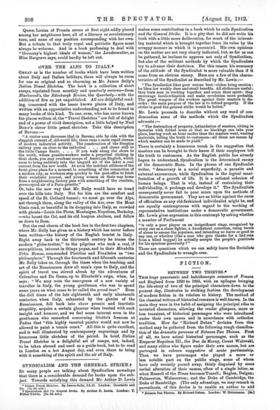SYNDICALISM AND THE GENERAL STRIKE. f So many people are
talking about Syndicalism nowadays that there is a considerable demand for books upon the sub- ject. Towards satisfying this demand Mr. Arthur D. Lewis
• Italian Travel Sketches. By James Sully, LL.D. London: Constable and Co. 1.7s. 6d. net.] -t Syndicalism and the General Strike. By Arthur D. Lewis. London I T. Fisher Unwire. [7s. 6d. not.] makes some contribution in a book which he calls Syndicalism and the General Strike. It is a pity that he did not write his
book with a little more deliberation, for much of the interest- ing material which is brought together loses its value by the scrappy manner in which it is presented. His own opinions on the matter are not very clearly indicated, but, so far as can be gathered, he inclines to approve not only of Syndicalism, but also of the militant methods by which the Syndicalists try to advance their doctrines. For this reason his summary of the attitude of the Syndicalist is more valuable than if it came from an obvious enemy. Here are a few of the charac- teristics of the Syndicalist as described by Mr. Lewis :—
" The Syndicalist likes poor unions best—riches bring caution : he likes low weekly dues and small benefits. All strikes are useful : they train men in working together and rouse their spirit : they encourage insubordination and make revolution more probable. The great weapon of the workers against their masters is dis- order : the main purpose of the law is to defend property. If the strike is good the general strike would be better."
Mr. Lewis proceeds to describe without any word of con- demnation some of the methods which the Syndicalista advocate:— " The destruction of property, intimidation of masters, sitting in factories with folded arms so that no blacklegs can take your place, leaving work an hour earlier than the masters want, wasting materials, telling the truth to customers—all these are means by which masters can be made to yield."
There is certainly a humorous touch in the suggestion that masters can be brought to their knees if their employees tell the truth to customers. As the English public has already
begun to understand, Syndicalism is the determined enemy of the democratic State. In the phrase of one Syndicalist
writer, " democracy is a social superfluity, a parasite and external excrescence, while Syndicalism is the logical mani- festation of a growth of life. It is a rational cohesion of human beings. That is why, instead of restraining their
individuality, it prolongs and develops it." The Syndicalista consequently never fail to pour scorn upon the methods of democratic government. They are as bitter against the curse
of officialism as any old-fashioned individualist might be, and are equally contemptuous with regard to the working of representative institutions under a democratic government. Mr. Lewis gives expression to this contempt by asking whether
a member of Parliament
"is only a poor player on an insignificant stage, recognized by every one as a sham fighter, a knockabout comedian, using terms of abuse to amuse the populace, and intending no harm or good to any one, or whether (like a man who gets thanks for a bad coin from a blind beggar) he actually accepts the people's gratitude for his spurious generosity ? "
These are questions which we can safely leave the Socialists and the Syndicalists to wrangle over.


































 Previous page
Previous page